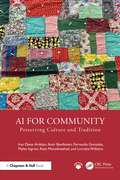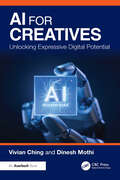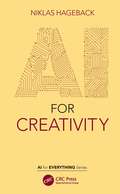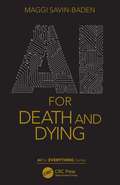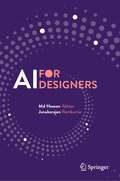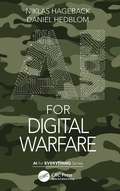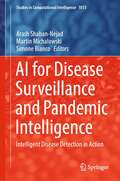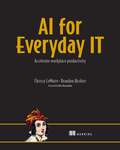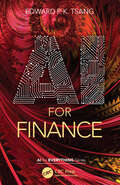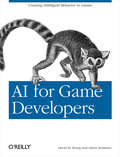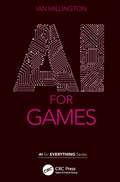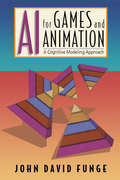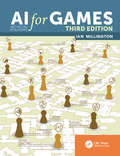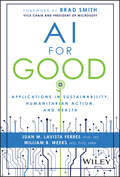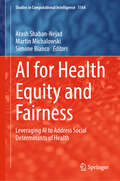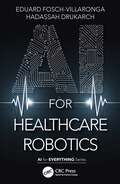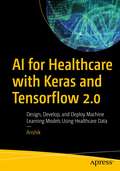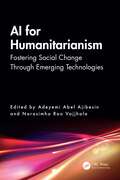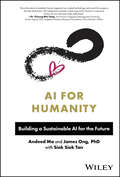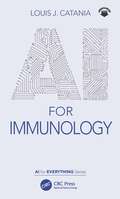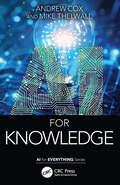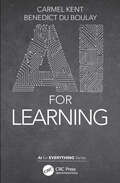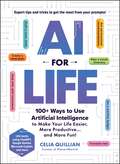- Table View
- List View
AI for Community: Preserving Culture and Tradition
by Fernando Gonzalez Iran Davar Ardalan Amir Banifatemi Myles Ingram Reza Moradinezhad Lucretia WilliamsAI for Community explores the transformative potential of technology to bridge cultural divides and responsibly preserve cultural heritage, while thoughtfully considering how to ensure fairness without any ideological or cultural bias. It acknowledges the need for careful scrutiny of traditions so that artificial intelligence (AI) systems can promote comprehensive cultural understanding. This approach underscores the promise of AI as a tool for human flourishing.Authored by a multigenerational, multicultural team, this book presents real‑world examples and ethical insights that are timely, actionable, and deeply human‑centered. It introduces pioneering projects like the Indigenous Knowledge Graph, which documented ancestral wisdom; Howard University’s Project Elevate Black Voices, funded by Google, which enhanced speech recognition for African American Vernacular English (AAVE); and Laleh AI, which posthumously preserves the insights of a progressive female Islamic thinker. Also, initiatives like UNESCO’s work on cultural heritage preservation and NVIDIA’s collaboration with Te Hiku Media to safeguard the Māori language showcase AI’s vital role in reviving endangered languages.This book interweaves "Community Voices" sections between chapters, featuring interviews that explore the role and implementation of AI in new arenas. Each chapter is also supported by online resources, accessible as podcasts, videos, and articles, that provide multimedia ways to deepen understanding of culturally aware AI.AI for Community highlights how community‑driven language preservation, storytelling, and inclusive design can empower cultures and protect their heritage. This book is a vital resource for those seeking to create AI that respects and uplifts communities.
AI for Creatives: Unlocking Expressive Digital Potential
by Vivian Ching Dinesh MothiAI for Creatives: Unlocking Expressive Digital Potential takes you on a dynamic journey into the future of creativity, where AI is reshaping how creators approach their craft. According to a 2023 UNESCO report, the global creative industries are valued at an astounding USD 4.3 trillion annually, employing nearly 30 million people worldwide. This essential guide empowers professionals across visual arts, music, writing, film, fashion, and design to leverage the transformative potential of AI to elevate their work in ways previously unimaginable.Designed as a practical handbook for creative professionals, this book provides a clear and approachable road map for integrating AI into your work, regardless of prior experience. Packed with real-world case studies, step-by-step walk-throughs, and insights into AI-driven tools, like RunwayML, Midjourney, Canva, and ChatGPT, the book demonstrates how AI can supercharge creative processes. Whether you are a filmmaker using AI for hyper-realistic visuals or a fashion designer predicting fabric trends, this guide offers the tools to unlock your full creative potential.The book also dives into the deeper ethical and legal questions that emerge as machines increasingly enter the creative arena. How do we strike the right balance between human ingenuity and machine-driven creativity? What happens to intellectual property rights when AI becomes a co-creator? This book tackles these pressing issues head-on, from navigating bias in AI algorithms to safeguarding the authenticity of creative works, while also exploring the role of education in navigating these challenges. With actionable insights, creative professionals will learn to embrace AI while preserving the integrity, originality, and values that define their craft.AI is not just changing how we create but also disrupting the future of employment and economic growth across the globe. With the demand for creative roles projected to surge by 30–40% by 2030, it is evermore critical to harness the power of AI to stay ahead, innovate faster, and meet the growing need for creative solutions across industries. Are you ready to explore the future of creativity and amplify your vision? Step into the next era of AI transformation with this essential guide—your creative revolution starts now.
AI for Creativity (AI for Everything)
by Niklas HagebackWhat is computational creativity? Can AI learn to be creative? One of the human mind’s most valuable features is the capacity to formulate creative thoughts, an ability that through quantum leap innovations has propelled us to the current digital age. However, creative breakthroughs are easier said than done. Appearing less frequently and more sporadically than desired, it seems that we have not yet fully cracked the creative code. But with the rapid advances in artificial intelligence which have come to provide an ever-closer proximity with the cognitive faculties of mankind, can this emerging technology improve our creative capabilities? What will that look like and will it be the missing link in the man–machine enigma? AI for Creativity provides a fascinating look at what is currently emerging in the very cutting-edge area of artificial intelligence and the tools being developed to enable computational creativity that holds the propensity to dramatically change our lives.
AI for Death and Dying (AI for Everything)
by Maggi Savin-BadenWhat is artificial intelligence (AI)? How does AI affect death matters and the digital beyond? How are death and dying handled in our digital age? AI for Dying and Death covers a broad range of literature, research and challenges around this topic. It explores ethical memorisation, digital legacies and bereavement, post death avatars and AI and the digital beyond. It also analyzes religious perspectives on AI for death and dying, and planning for death in a digital age. Maggi Savin-Baden is a Professor of Education at the University of Worcester and has researched and evaluated staff and student experiences of learning for over 20 years and gained funding in this area (Leverhulme Trust, JISC, Higher Education Academy, MoD). She has a strong publication record of over 50 research publications and 17 books which reflect her research interests on the impact of innovative learning, digital fluency, cyber-influence, pedagogical agents, qualitative research methods and problem-based learning. In her spare time, she runs, bakes, climbs and attempts triathalons.
AI for Designers
by Md Haseen Akhtar Janakarajan RamkumarThis book presents select research writings from researchers and professionals around the globe on the application, potential, and limitations of AI in different domains. The topics covered include AI in product design, AI in architecture design, AI in textile design, AI in interaction design, and AI for society in general. The book also discusses various cross-applications of AI in other industrial sectors like urban planning and design, AI for inclusive future, etc. The book is a valuable reference for designers in multidisciplinary areas. This book is of interest for anyone who is a beginner, researcher, and professional interested in artificial intelligence and allied fields.
AI for Digital Warfare (AI for Everything)
by Niklas Hageback Daniel HedblomAI for Digital Warfare explores how the weaponising of artificial intelligence can and will change how warfare is being conducted, and what impact it will have on the corporate world. With artificial intelligence tools becoming increasingly advanced, and in many cases more humanlike, their potential in psychological warfare is being recognised, which means digital warfare can move beyond just shutting down IT systems into more all-encompassing hybrid war strategies.
AI for Disease Surveillance and Pandemic Intelligence: Intelligent Disease Detection in Action (Studies in Computational Intelligence #1013)
by Simone Bianco Arash Shaban-Nejad Martin MichalowskiThis book aims to highlight the latest achievements in the use of artificial intelligence for digital disease surveillance, pandemic intelligence, as well as public and clinical health surveillance. The edited book contains selected papers presented at the 2021 Health Intelligence workshop, co-located with the Association for the Advancement of Artificial Intelligence (AAAI) annual conference, and presents an overview of the issues, challenges, and potentials in the field, along with new research results. While disease surveillance has always been a crucial process, the recent global health crisis caused by COVID-19 has once again highlighted our dependence on intelligent surveillance infrastructures that provide support for making sound and timely decisions. This book provides information for researchers, students, industry professionals, and public health agencies interested in the applications of AI in population health and personalized medicine.
AI for Diversity (AI for Everything)
by Roger A. SøraaArtificial intelligence (AI) is increasingly impacting many aspects of people’s lives across the globe, from relatively mundane technology to more advanced digital systems that can make their own decisions. While AI has great potential, it also holds great peril depending on how it is designed and used. AI for Diversity questions how AI technology can lead to inclusion or exclusion for diverse groups in society. The way data is selected, trained, used, and embedded into societies can have unfortunate consequences unless we critically investigate the dangers of systems left unchecked, and can lead to misogynistic, homophobic, racist, ageist, transphobic, or ableist outcomes. This book encourages the reader to take a step back to see how AI is impacting diverse groups of people and how diversity-awareness strategies can impact AI.
AI for Everyday IT: Accelerate workplace productivity
by Chrissy LeMaire Brandon AbshireAutomate and accelerate your everyday IT tasks with instant solutions!What if you never had to write another after-incident report, piece of boilerplate code, or a performance review from scratch ever again? Use AI tools like ChatGPT, Claude, Gemini, and Copilot right, and you&’ll take back hours of your time—and more! AI for Everyday IT reveals how you can automate dozens of your daily IT tasks with generative AI. In AI for Everyday IT you&’ll learn how to: • Write effective prompts for common IT tasks • Optimize report generation, document handling, and workplace communication • Resolve IT conflicts and crises • Acquire new skills and upgrade your resume • AI for help desk, database administration and systems administration • Incorporate AI into DevOps processes and create AI-powered applications • Simplify time-consuming people management tasks In this hands-on guide, automation experts Chrissy LeMaire and Brandon Abshire show you how AI tools like ChatGPT have made their lives a million times easier, and how they can do the same for you. You&’ll find proven strategies for using AI to improve help desk support, automate sysadmin and database tasks, aid with DevOps engineering, handle managing IT teams, and dozens more time-saving and quality-improving hacks. Foreword by Nitya Narasimhan. About the technology Have you lost days sifting through logs to find a latency issue? AI can do it in seconds! Need to update your documentation? Mere moments for AI. Are you writing scripts, designing data recovery strategies, and evaluating network designs? AI can handle it all—if you know how to use it. About the book AI for Everyday IT shows you exactly how AI can transform support desk operations, root cause analysis, disaster recovery planning—even writing professional emails when you&’re too furious to be nice! This instantly-useful guide has time-saving techniques for all IT pros—from devs and DBAs to technical writers and product managers. Each relatable example is fully illustrated with the prompts and problem formulation strategies, along with interesting insights and anecdotes from authors Chrissy Lemaire and Brandon Abshire. What's inside • Document handling and workplace communication • Database administration and development • DevOps engineering and AI powered apps • People management and career planning About the reader Whether you&’re working in operations, development, management, or security, you&’ll love these productivity hacks for generative AI. No previous AI experience required. About the author Chrissy LeMaire is a dual Microsoft MVP and GitHub Star, the creator of dbatools, and author of the Manning book Learn dbatools in a Month of Lunches. Brandon Abshire has spent over twenty years in IT, including roles at a leading Fortune 500 semiconductor and telecommunications company and multiple top-ranked US hospital systems. Table of Contents Part 1 1 Artificial intelligence in IT 2 Chatbots: Tasks and tips 3 Basic intelligence 4 Prompt engineering and problem formulation 5 Prompts in action 6 Document handling 7 Emails and instant messaging in the workplace Part 2 8 IT support and service desk 9 Systems administration 10 Database administration and development Part 3 11 Code assistants and development tools 12 AI in DevOps engineering 13 Building AI-powered applications Part 4 14 Conflict resolution and crisis management 15 Management essentials 16 Management interventions 17 Career advancement A Local AI models: An accessible alternative B OpenAI GPT Actions
AI for Finance (AI for Everything)
by Edward P. TsangFinance students and practitioners may ask: can machines learn everything? Could AI help me? Computing students or practitioners may ask: which of my skills could contribute to finance? Where in finance should I pay attention? This book aims to answer these questions. No prior knowledge is expected in AI or finance. To finance students and practitioners, this book will explain the promise of AI, as well as its limitations. It will cover knowledge representation, modelling, simulation and machine learning, explaining the principles of how they work. To computing students and practitioners, this book will introduce the financial applications in which AI has made an impact. This includes algorithmic trading, forecasting, risk analysis portfolio optimization and other less well-known areas in finance. This book trades depth for readability. It aims to help readers to decide whether to invest more time into the subject. This book contains original research. For example, it explains the impact of ignoring computation in classical economics. It explains the relationship between computing and finance and points out potential misunderstandings between economists and computer scientists. The book also introduces Directional Change and explains how this can be used.
AI for Game Developers: Creating Intelligent Behavior in Games
by Glenn Seemann David M BourgAdvances in 3D visualization and physics-based simulation technology make it possible for game developers to create compelling, visually immersive gaming environments that were only dreamed of years ago. But today's game players have grown in sophistication along with the games they play. It's no longer enough to wow your players with dazzling graphics; the next step in creating even more immersive games is improved artificial intelligence, or AI.Fortunately, advanced AI game techniques are within the grasp of every game developer--not just those who dedicate their careers to AI. If you're new to game programming or if you're an experienced game programmer who needs to get up to speed quickly on AI techniques, you'll find AI for Game Developers to be the perfect starting point for understanding and applying AI techniques to your games.Written for the novice AI programmer, AI for Game Developers introduces you to techniques such as finite state machines, fuzzy logic, neural networks, and many others, in straightforward, easy-to-understand language, supported with code samples throughout the entire book (written in C/C++). From basic techniques such as chasing and evading, pattern movement, and flocking to genetic algorithms, the book presents a mix of deterministic (traditional) and non-deterministic (newer) AI techniques aimed squarely at beginners AI developers. Other topics covered in the book include:Potential function based movements: a technique that handles chasing, evading swarming, and collision avoidance simultaneouslyBasic pathfinding and waypoints, including an entire chapter devoted to the A* pathfinding algorithmAI scriptingRule-based AI: learn about variants other than fuzzy logic and finite state machinesBasic probabilityBayesian techniquesUnlike other books on the subject, AI for Game Developers doesn't attempt to cover every aspect of game AI, but to provide you with usable, advanced techniques you can apply to your games right now. If you've wanted to use AI to extend the play-life of your games, make them more challenging, and most importantly, make them more fun, then this book is for you.
AI for Games (AI for Everything)
by Ian MillingtonWhat is artificial intelligence? How is artificial intelligence used in game development? Game development lives in its own technical world. It has its own idioms, skills, and challenges. That’s one of the reasons games are so much fun to work on. Each game has its own rules, its own aesthetic, and its own trade-offs, and the hardware it will run on keeps changing. AI for Games is designed to help you understand one element of game development: artificial intelligence (AI).
AI for Games and Animation: A Cognitive Modeling Approach
by John David FungeJohn Funge introduces a new approach to creating autonomous characters. Cognitive modeling provides computer-animated characters with logic, reasoning, and planning skills. Individual chapters in the book provide concrete examples of advanced character animation, automated cinematography, and a real-time computer game. Source code, animations, imag
AI for Games, Third Edition
by Ian MillingtonAI is an integral part of every video game. This book helps professionals keep up with the constantly evolving technological advances in the fast growing game industry and equips students with up-to-date information they need to jumpstart their careers. This revised and updated Third Edition includes new techniques, algorithms, data structures and representations needed to create powerful AI in games. Key Features A comprehensive professional tutorial and reference to implement true AI in games Includes new exercises so readers can test their comprehension and understanding of the concepts and practices presented Revised and updated to cover new techniques and advances in AI Walks the reader through the entire game AI development process
AI for Good: Applications in Sustainability, Humanitarian Action, and Health
by Juan M. Lavista Ferres William B. WeeksDiscover how AI leaders and researchers are using AI to transform the world for the better In AI for Good: Applications in Sustainability, Humanitarian Action, and Health, a team of veteran Microsoft AI researchers delivers an insightful and fascinating discussion of how one of the world’s most recognizable software companies is tacking intractable social problems with the power of artificial intelligence (AI). In the book, you’ll learn about how climate change, illness and disease, and challenges to fundamental human rights are all being fought using replicable methods and reusable AI code. The authors also provide: Easy-to-follow, non-technical explanations of what AI is and how it works Examinations of how healthcare is being improved, climate change is being addressed, and humanitarian aid is being facilitated around the world with AI Discussions of the future of AI in the realm of social benefit organizations and efforts An essential guide to impactful social change with artificial intelligence, AI for Good is a must-read resource for technical and non-technical professionals interested in AI’s social potential, as well as policymakers, regulators, NGO professionals, and, and non-profit volunteers.
AI for Health Equity and Fairness: Leveraging AI to Address Social Determinants of Health (Studies in Computational Intelligence #1164)
by Simone Bianco Arash Shaban-Nejad Martin MichalowskiThis book aims to highlight the latest achievements in the use of AI for improving Health Equity and Fairness. The edited volume contains selected papers presented at the 2024 Health Intelligence workshop, co-located with the Thirty-Eight Association for the Advancement of Artificial Intelligence (AAAI) conference, and presents an overview of the issues, challenges, and potentials in the field, along with new research results. This book provides information for researchers, students, industry professionals, clinicians, and public health agencies interested in the applications of AI in medicine and public health.
AI for Healthcare Robotics (AI for Everything)
by Eduard Fosch-Villaronga Hadassah DrukarchWhat is artificial intelligence (AI)? What is healthcare robotics? How can AI and healthcare robotics assist in contemporary medicine? Robotics and AI can offer society unimaginable benefits, such as enabling wheelchair users to walk again, performing surgery in a highly automated and minimally invasive way, and delivering care more efficiently. AI for Healthcare Robotics explains what healthcare robots are and how AI empowers them in achieving the goals of contemporary medicine.
AI for Healthcare with Keras and Tensorflow 2.0: Design, Develop, and Deploy Machine Learning Models Using Healthcare Data
by AnshikLearn how AI impacts the healthcare ecosystem through real-life case studies with TensorFlow 2.0 and other machine learning (ML) libraries.This book begins by explaining the dynamics of the healthcare market, including the role of stakeholders such as healthcare professionals, patients, and payers. Then it moves into the case studies. The case studies start with EHR data and how you can account for sub-populations using a multi-task setup when you are working on any downstream task. You also will try to predict ICD-9 codes using the same data. You will study transformer models. And you will be exposed to the challenges of applying modern ML techniques to highly sensitive data in healthcare using federated learning. You will look at semi-supervised approaches that are used in a low training data setting, a case very often observed in specialized domains such as healthcare. You will be introduced to applications of advanced topics such as the graph convolutional network and how you can develop and optimize image analysis pipelines when using 2D and 3D medical images. The concluding section shows you how to build and design a closed-domain Q&A system with paraphrasing, re-ranking, and strong QnA setup. And, lastly, after discussing how web and server technologies have come to make scaling and deploying easy, an ML app is deployed for the world to see with Docker using Flask.By the end of this book, you will have a clear understanding of how the healthcare system works and how to apply ML and deep learning tools and techniques to the healthcare industry.What You Will LearnGet complete, clear, and comprehensive coverage of algorithms and techniques related to case studies Look at different problem areas within the healthcare industry and solve them in a code-first approachExplore and understand advanced topics such as multi-task learning, transformers, and graph convolutional networksUnderstand the industry and learn ML Who This Book Is ForData scientists and software developers interested in machine learning and its application in the healthcare industry
AI for Humanitarianism: Fostering Social Change Through Emerging Technologies
by Pooja Sharma Christian Kaunert Manju Khari Bhupinder Singh Narasimha Rao Vajjhala Anjana Sharma Adeyemi Abel Ajibesin Bashir Eseyin Abdullahi Taiwo Abiodun Jyoti Batra Murat Tahir Çaldağ Eriona Çela Neelatphal Chanda Philip Eappen Azubuike Erike Tarcízio Ferrão Ebru Gökalp Ishayu Gupta Radha Srinivasan Iyer Yusuf Kabir Kasum Munir Maharazu Kubau Devender Kumar Bashir Malgwi Yusuf Mshelia Yerzhan B. Mukashev Emeka Ogbuju Francisca Oladipo Edoghogho Olaye Bamidele Oluwade Rajasekhara Mouly Potluri Babatunde Dauda Raheem Md Mahfujur Rahman Santhosh Kumar Rajamani Selene Roldán Ruiz Arturo Roman Cesar Sanjuan Hussein Umar Samuel C. Avemaria Utulu Ayush Verma Abraham ZirraThis book explores the transformative potential of artificial intelligence (AI) in addressing critical humanitarian challenges. It examines AI’s role in enhancing emergency responses, poverty alleviation, and healthcare.Chapters authored by a diverse group of international contributors cover topics such as AI’s application in disease prediction, ethical AI practices, and innovative resource distribution. This book uniquely blends theoretical insights with practical case studies, providing a road map for leveraging AI in humanitarian efforts. Readers will benefit from detailed explorations of AI’s capabilities and challenges, gaining insights into how AI can drive social change and improve global humanitarian outcomes.Targeted at policymakers, researchers, practitioners, and anyone interested in the intersection of AI and humanitarianism, this book offers valuable perspectives on ensuring AI technologies are both advanced and ethically sound.
AI for Humanity: Building a Sustainable AI for the Future
by Andeed Ma James Ong Siok Siok TanCapture the value of cutting-edge AI while mitigating its most salient risks AI For Humanity: Building a Sustainable AI for the Future delivers an incisive and timely discussion of how to design, build, and implement cutting-edge AI in for-profit firms and other organizations in a responsible, sustainable, and ethical way. The book walks you through the three pillars of human-focused AI development—governance, technology, and commercialization—and dives deep into each one, showing you how to create AI products and services that better humanity and advance universally held values. You'll find methodologies and frameworks that mitigate against some of the most profound and unsettling risks of unchecked artificial intelligence development, and roadmaps to help you avoid the numerous pitfalls and traps awaiting unsuspecting companies, managers, and executives. You'll also discover: Real-world case studies, from companies including SAP, Huawei, and Tencent, demonstrating the actual dilemmas and questions firms face when developing and implementing this extraordinary tech Actionable commitments you can make to help ensure you and your company avoid the ethical and reputational risks associated with AI Strategies for AI product and service development consistent with sustainable growth Perfect for managers, executives, directors, and other business leaders with a stake in responsible artificial intelligence design, development, and implementation, AI For Humanity will also interest regulators, academics, thought leaders, and policy makers doing their best to capture AI's substantial potential value while mitigating its most serious risks.
AI for Immunology (AI for Everything)
by Louis J. CataniaThe bioscience of immunology has given us a better understanding of human health and disease. Artificial intelligence (AI) has elevated that understanding and its applications in immunology to new levels. Together, AI for immunology is an advancing horizon in health care, disease diagnosis, and prevention. From the simple cold to the most advanced autoimmune disorders and now pandemics, AI for immunology is unlocking the causes and cures. Key features: A highly accessible and wide-ranging short introduction to AI for immunology Includes a chapter on COVID-19 and pandemics Includes scientific and clinical considerations, as well as immune and autoimmune diseases
AI for Knowledge (AI for Everything)
by Mike Thelwall Andrew CoxAI for Knowledge explores the question of whether artificial intelligence (AI) is transforming knowledge access and creation for the good. AI is accelerating our access to knowledge through search, recommendation, summarisation, translation and a proliferating range of tools with AI built in. Generative AI is further changing how we use and create information at home and in the workplace. Yet AI also has a dark side with hallucination, bias and lack of explainability, as well as potential for harmful impacts on social equity and the environment.The book investigates how AI will impact everyday knowledge discovery, understanding and creation. It considers both the positive benefits and the many informational and ethical challenges, including the impact on our wider information culture. It then weighs up the impact on scholarship, in science, social science and the humanities and including the processes of scholarly communication. It explains the role of libraries and archives and how they could be enhanced using AI. It concludes by showing how governments can regulate AI to ensure social benefit and outlines what we as individuals need to know about AI.The book helps the reader see through some of the AI hype to understand much more clearly what are the issues around the impact of AI on knowledge access and creation, including the implications for environmental sustainability and the power of Big Tech. What emerges is a nuanced picture of potential benefit and risk, especially when we consider the experiences of those with less privileged access to the digital, particularly those outside the Global North.
AI for Learning (AI for Everything)
by Carmel Kent Benedict du BoulayWhat is artificial intelligence (AI)? How can AI help a learner, a teacher or a system designer? What are the positive impacts of AI on human learning? AI for Learning examines how artificial intelligence can, and should, positively impact human learning, whether it be in formal or informal educational and training contexts. The notion of ‘can’ is bound up with ongoing technological developments. The notion of ‘should’ is bound up with an ethical stance that recognises the complementary capabilities of human and artificial intelligence, as well as the objectives of doing good, not doing harm, increasing justice and maintaining fairness. The book considers the different supporting roles that can help a learner – from AI as a tutor and learning aid to AI as a classroom moderator, among others – and examines both the opportunities and risks associated with each.
AI for Life: 100+ Ways to Use Artificial Intelligence to Make Your Life Easier, More Productive…and More Fun!
by Celia QuillianDemystify the world of artificial intelligence with this groundbreaking guide featuring over 100 innovative ways to incorporate AI into your daily life.Every day, it seems like there&’s a new AI tool on the market and a new, complicated way to use it. But what if you could use AI to make your life easier without the complications? In AI for Life, AI expert and creator of @SmartWorkAI offers over 100 ideas and ready-to-use prompts to get AI beginners started using the technology to actually improve their lives. Beginning with a primer on the basics—including an overview of the popular and free AI tools—you will learn expert-tested tips and tricks to get the most out of your AI use, such as layering prompts to dive deeper into an initial response or asking for the output in different formats. Packed with practical how-to information, AI for Life is the must-have guide for using generative AI to make life easier, more productive, more organized, and more fun!
AI for Peace (AI for Everything)
by Paige Arthur Branka PanicThe role of artificial intelligence in war is widely recognized, but is there also a role for AI in fostering peace and preventing conflict? AI for Peace provides a new perspective on AI as a potential force for good in conflict-affected countries through its uses for early warning, combating hate speech, human rights investigations, and analyzing the effects of climate change on conflict. This book acts as an essential primer for introducing people working on peacebuilding and conflict prevention to the latest advancements in emerging AI technologies and will act as guide for ethical future practice. This book also aims to inspire data scientists to engage in the peacebuilding and prevention fields and to better understand the challenges of applying data science in conflict and fragile settings.
